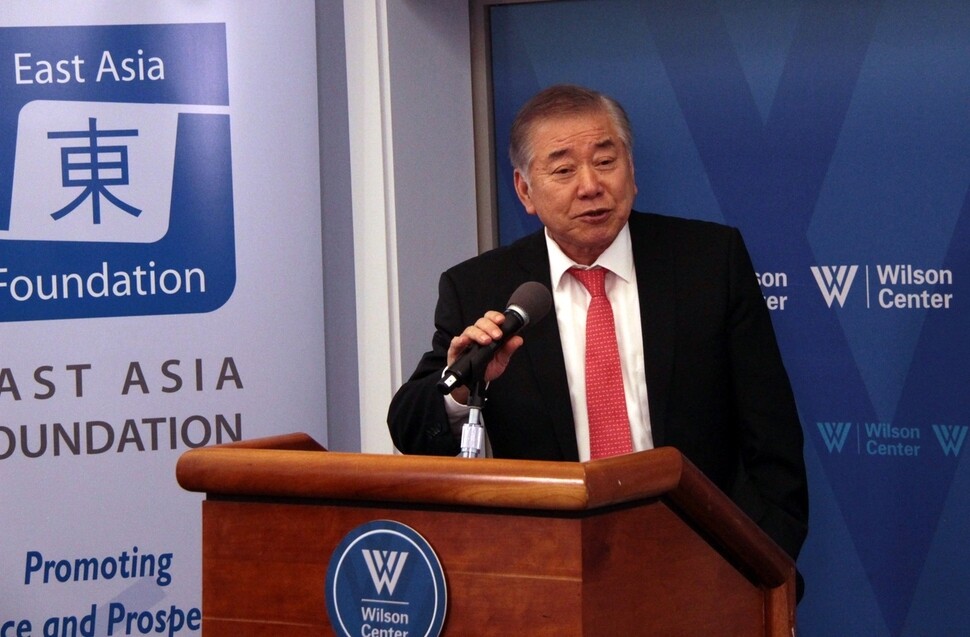hankyoreh
Links to other country sites 다른 나라 사이트 링크
[Column] Where does South Korea’s obligation to the US end?

President Moon’s special advisor on unification, foreign affairs, and national security and professor emeritus at Yonsei University Moon Chung-in is a regular target for conservatives. Right-wing political parties continuing calling for his dismissal, painting him as a foolish “anti-American” and “North Korean mouthpiece.”
Why do conservatives loathe Moon Chung-in so much? The situation began when the conservative press went on the attack over statements he made during a seminar in Washington last June ahead of a South Korea-US summit, when he suggested that “if North Korea halts its nuclear and missile activities, we might discuss a reduction of joint military exercises with the US and the US strategic weaponry deployed on the Korean Peninsula.” More recently, he drew controversy by saying that “even if there is a shattering of the South Korea-US alliance, many people do not think that would not mean war.”
In point of fact, the idea that a halt to North Korean nuclear and missile activities and a downscaling of South Korea-US joint exercises might provide some point of entry for negotiations on the North Korean nuclear issue is a diplomatic solution that even American experts in Washington, D.C. think tanks have posited. Indeed, the US actually did downscale its role in the joint Ulchi exercises last August. When people try to cleverly twist Moon’s remarks that “a shattering of the South Korea-US alliance would not mean war” into an argument in favor of ending the alliance, do they mean to suggest South Korea should fight a war if that’s what it takes to keep the alliance intact?
By going after Moon, what they are really trying to do is prevent the Moon Jae-in administration’s foreign affairs and national security policy from ever straying outside the lines drawn by the pro-US contingent. They take issue with Moon Chung-in’s position that as vital as the South Korea-US relationship is, it is problematic when things reach the point that the alliance is treated like a religion and no perspectives that differ from the US’s can be voiced.
Moon is an expert in foreign affairs and national security who has collaborated with eminent US experts proposing a diplomatic solution to the North Korean nuclear issue, and who possesses a wide range of connections in China, Japan, and Russia as well. He has suggested that South Korea’s diplomatic options should be increased by developing relations with China and Russia in addition to cooperation with the US and Japan.
Pro-US South Korean conservatives can’t bear to hear him argue that we can value the South Korea-US alliance, while at the same time pursuing policies from South Korea’s own perspective and cooperating with China and Russia. Are they really any different from the ones who drove Joseon to catastrophe during the 17th century Qing invasion by arguing that the Ming dynasty – which represented the “kingdom of the son of Heaven” to the Qing’s “barbarians” – deserved only gratitude for rescuing them from potential collapse?
Where do things end if South Korea continues to allow itself to be dragged around by the US without finding its own balance? US President Donald Trump has fanned anxieties here and abroad on an almost daily basis with his tweets, stirring up discord and strife with his own White House advisors and the Secretary of State. Republican Senate Committee on Foreign Relations chairman Bob Corker, one of Trump’s initial supporters during his presidential candidacy, even suggested Trump’s indiscriminate threats could set the US on the “path to World War III.”
Even as he throws his support behind the military and its generals and increases the defense budget by over 10% from the year before, Trump openly disregards the State Department, which is in charge of foreign relations, and declares plans not to fill key positions there. There is no sign of respect for the alliance in his approach to South Korea, either; instead, he merely threatens to back out of the KORUS FTA and withdraw US Forces Korea in order to pressure for renegotiations and a swift THAAD deployment. Trump may yet succeed in fattening defense business bellies by using his tweets to bully allies into buying expensive state-of-the-art weaponry, or win some kind of capitulation in trade negotiations that benefits his side. In the end, however, he stands to lose more than he has to gain by accelerating the decline of US dominance. The US’s soft power and systems are losing their persuasiveness fast.

What would US Secretary of Defense James Mattis do if Trump were to order a nuclear strike in retaliation for a North Korean hydrogen bomb test? This question was recently asked by the Washington Post, which concluded that Mattis may try to talk Trump out of it, but that he would probably follow Trump’s orders as Commander-in-Chief. The question is: what should South Korea do?
By Park Min-hee, international editor
Please direct questions or comments to [english@hani.co.kr]

Editorial・opinion
![[Editorial] Intensifying US-China rivalry means Seoul must address uncertainty with Beijing sooner than later [Editorial] Intensifying US-China rivalry means Seoul must address uncertainty with Beijing sooner than later](https://flexible.img.hani.co.kr/flexible/normal/500/300/imgdb/original/2024/0517/8117159322045222.jpg) [Editorial] Intensifying US-China rivalry means Seoul must address uncertainty with Beijing sooner than later
[Editorial] Intensifying US-China rivalry means Seoul must address uncertainty with Beijing sooner than later![[Column] When ‘fairness’ means hate and violence [Column] When ‘fairness’ means hate and violence](https://flexible.img.hani.co.kr/flexible/normal/500/300/imgdb/original/2024/0516/7417158465908824.jpg) [Column] When ‘fairness’ means hate and violence
[Column] When ‘fairness’ means hate and violence- [Editorial] Yoon must stop abusing authority to shield himself from investigation
- [Column] US troop withdrawal from Korea could be the Acheson Line all over
- [Column] How to win back readers who’ve turned to YouTube for news
- [Column] Welcome to the president’s pity party
- [Editorial] Korea must respond firmly to Japan’s attempt to usurp Line
- [Editorial] Transfers of prosecutors investigating Korea’s first lady send chilling message
- [Column] Will Seoul’s ties with Moscow really recover on their own?
- [Column] Samsung’s ‘lost decade’ and Lee Jae-yong’s mismatched chopsticks
Most viewed articles
- 1For new generation of Chinese artists, discontent is disobedience
- 2[Editorial] Transfers of prosecutors investigating Korea’s first lady send chilling message
- 3S. Korea “monitoring developments” after report of secret Chinese police station in Seoul
- 4Xi, Putin ‘oppose acts of military intimidation’ against N. Korea by US in joint statement
- 5[Exclusive] Unearthed memo suggests Gwangju Uprising missing may have been cremated
- 6N. Korean media upgrades epithet for leader’s daughter from “beloved” to “respected”
- 7Yoon says concern about biased diplomacy is being incited by “communist totalitarian forces”
- 8[Column] US troop withdrawal from Korea could be the Acheson Line all over
- 9[Editorial] Intensifying US-China rivalry means Seoul must address uncertainty with Beijing sooner t
- 10[Interview] Recalling seeing soldiers secretly burying bodies behind Gwangju Prison